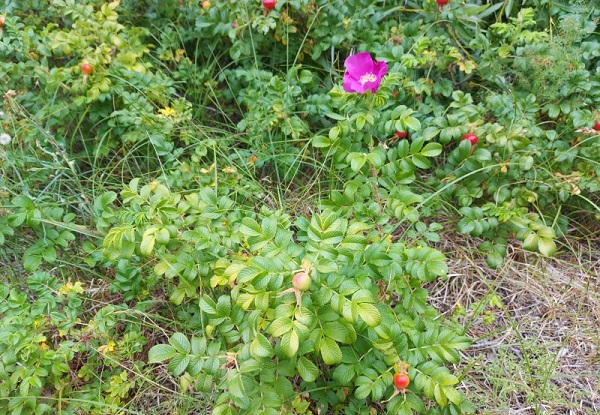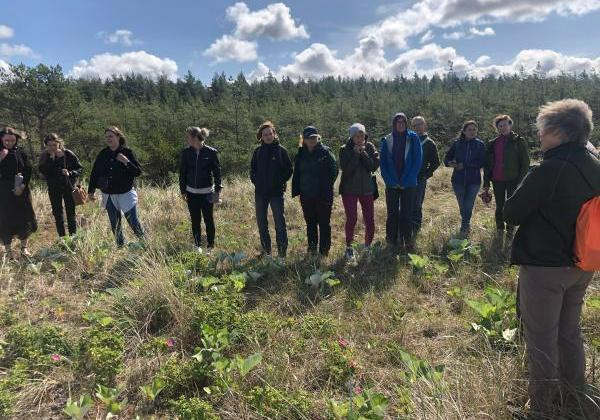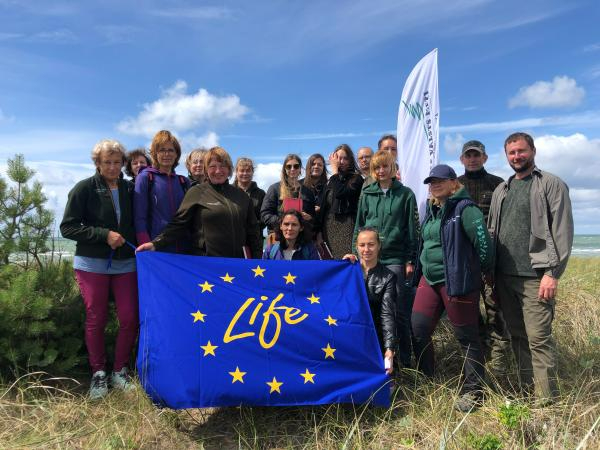LVM to Limit the Invasive Beach Rose in Ziemupe Nature Reserve
JSC “Latvia's State Forests” (LVM) will limit the invasive beach rose Rosa rugosa in Ziemupe Nature Reserve in Dienvidkurzeme region. It is necessary because this plant transforms the natural vegetation of the open dunes and reduces biodiversity, thus threatening local typical and specially protected species. The works will cover an area of 10 hectares. To inform about the planned activities and decide on the best solutions for limiting the invasive rose, an expert-level seminar was held in the areas of the planned works on 19 July.
Beach rose control will be carried out by LVM within the framework of the LIFE-IP LatViaNature project.
In recent decades, the beach rose has spread rapidly along the coast of Latvia. Ziemupe Nature Reserve has been selected for the containment works, because here the rose suppresses the stands of an extremely rare, natural and visually exotic plant species in Latvia – the sea holly or Eryngium maritimum – which has been found only in two places in Latvia, including Ziemupe. Curbing the beach rose is difficult because the plant has a deep root system that extends several metres deep.
Sea holly (Eryngium maritimum)
Three environmentally friendly methods will be used to control the beach rose in Ziemupe: digging with hand tools, digging with light equipment, and burning. At the same time, specialists will evaluate which of the methods is the most effective for limiting the invasive plant in Latvia, so that this method can be used more extensively in other areas infested with roses in the future.
“All the proposed methods are environmentally friendly and safe. Similar methods, all based on scientific data, have also been successfully used in Sweden, where the beach rose has spread particularly widely along the Baltic Sea coast, suppressing rare species and significantly changing the coastal landscape. True, due to the widespread distribution of the beach rose there, the works were carried out on significantly larger areas and over a period of more than 20 years. Our goal is to protect unique and rare species in Latvia and to find the most effective method to limit the invasive beach rose; this way we will promote communities and processes of natural species in specially protected natural areas,” says dune habitat specialist Ieva Rove.
In Ziemupe, in places where the beach rose bushes have grown more densely and together form larger areas, the bushes will be dug up using small equipment, which is light and does not damage the dunes. The excavated parts will be collected and burnt. Where rose bushes form medium-sized areas, they will be dug up with a spade. The locations of the extremely rare and protected sea holly will be surveyed and marked on maps. In these areas, during the works, it will not be allowed to move with machinery, but the digging of the rose will be done with hand tools to prevent any possibility of damage. In turn, in the part of the work area, where the beach rose bushes are lower and do not grow densely, a method of containment that is new to Latvia will be used and tested, namely, supervised and safe burning using a special dome that will limit the fire, allowing it to be used directly in a targeted manner hope for burning.
Like in other European countries, the beach rose has arrived in Latvia in different forms. In the first half of the 20th century, it was introduced as an ornamental plant and was purposefully planted in specific places by the sea for both recreational purposes (to regulate the flow of visitors and for beauty) and to strengthen the dunes, but in other places it has grown in the dunes as an escaped plant, because it is also planted as a flowering shrub in the gardens of houses. Birds and humans also contribute to the spread of the beach rose by inadvertently carrying the seeds of the rose fruit.
Representatives of LVM, the State Forest Service, LIFE-IP LatViaNature project, municipality of Dienvikurzeme region and residents of nearby houses participated in the 19 July seminar.
The project “Optimization of management and management of Natura 2000 protected areas” (LIFE19IPE/LV/000010 LIFE-IP LatViaNature) is implemented with the financial support of the LIFE programme of the European Union and the State Regional Development Agency and its goal is to improve the nature protection system in Latvia. In the course of the LIFE-IP LatViaNature project, it is planned to develop innovative and appropriate approaches to solving current nature protection issues and implement the priority action program for Natura 2000 territories, thus ensuring a favourable protection status of habitats and species of European Union importance in Latvia. The project is expected to be implemented by the end of 2028.







